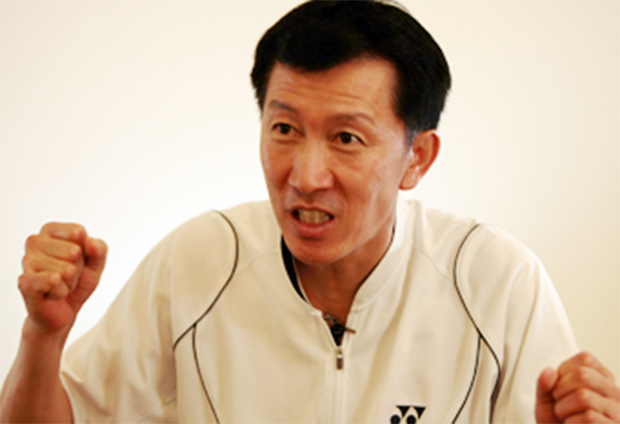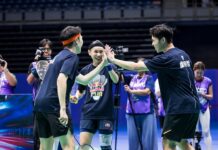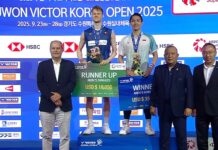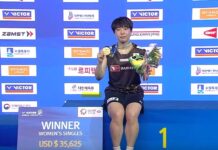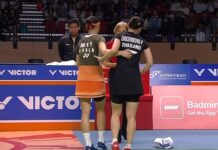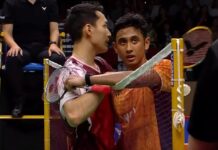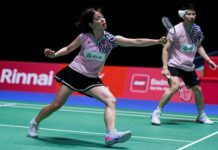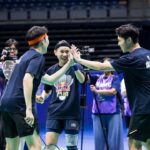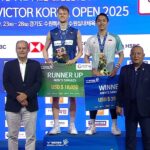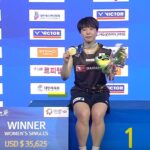By Kwon Ji-youn
Long before there was Lee Yong-dae, there was Park Joo-bong.
Lee may be the current badminton mogul, but Park owns five world championship titles and has conquered 72 international competitions. On the contrary, Lee, his successor, has yet to top the world championship podium.
Park, now at the helm of the Japanese national badminton team, found himself opposite his scion during an Asian Games quarterfinal match last year in Incheon.
“As a Korean, it felt unnatural to be doing my best to help the Japanese team win, and on Korean soil no less,” Park said in a recent interview.
“The Asiad is an international event. I could almost feel the country’s eyes on us.”
Though they say heading a national team is tantamount to drinking from a poisoned chalice, taking the reins of the Japanese national team in 2004 after serving as head coach of the U.K. and Malaysian teams has done Park more good than harm. Just prior, the 50-year-old had coached the Korean national team to one gold medal, two silvers and a bronze at the Athens Olympics.
“Coaching the Japanese team has been rewarding,” said Park. “We have made significant progress over the last 10 years.”
But Park doesn’t deny that he one day hopes to manage the Korean team once more.
“It’s a sensitive question, what with all the ‘factional strife’ as they call it,” Park said. “But it’s true that I hope one day to be able to serve the country and coach the Korean team on international stages.”
The king steps down
The 1992 Olympic gold medalist thrice announced his retirement from badminton throughout his athletic career.
When he first retired in 1993, Park had received an offer to teach at the Korea National Sport University (KNSU), and he had jumped at the chance.
“At the time, badminton had been a relatively unknown sport, and it was difficult to find a job after retirement,” Park said. “But I was asked to teach at the KNSU, which was a rare chance.”
But just six months later, he made an unexpected comeback to the courts when the Badminton Korea Association (BKA) expressed hopes that he would help defend the country’s title at the Sudirman Cup, the world mixed team badminton championship.
“So I did,” he said. “Team Korea defeated Indonesia 3-2, and then I took leave.”
But when he learned that mixed doubles would be made an official event at the 1996 Atlanta Olympics, Park found the BKA’s request for reappearance even more tempting. He had been No. 1 in mixed doubles when the Barcelona Games took place in 1992, but the event had not made its Olympic debut then. In Barcelona, Park and partner Kim Moon-soo had snagged gold in the men’s double event.
“I had been teaching kids for two and a half years when the BKS asked that I take part in the mixed doubles competition at the Atlanta Games,” he recalled. “I couldn’t help but think, if not now, when would I compete in mixed doubles at an Olympics?”
After a silver-medal finish at Atlanta, Park resumed teaching at the KNSU, only to be offered a national team coaching position in England. When the university declined his request for a leave of absence, he quit. That was how much he wanted to coach at the international level. He wanted to learn English while coaching, he said.
After moving to Malaysia, where he managed his second national team, Park spent 11 years managing Team Japan, which is ironic considering he made his national team debut in 1980 under a Japanese coach.
“At the London Olympics, Team Japan bagged its first ever medal, and at the Thomas Cup, it topped the podium,” he said.
Park said that coaching in Japan gives him an authority that would likely not be granted to a head coach in Korea.
“In Korea, there are people above the head coach who control the team, but here in Japan, the coach has an edge of his or her own,” he said. “I’m able to do what I need to do to get my team to the crown.”
Another difference is that the Japanese team is given more leg room when training, Park pointed out. He explained that Japanese athletes are convened ahead of important international competitions, but are otherwise given the freedom to train with their home team.
“I can’t say which is right or wrong, but Japan has improved notably in the last decade,” he said. “That says a lot.”
Future of Korean badminton
Park’s goal throughout his athletic career was to put badminton on the map by triumphing at sanctioned events like the Asian Games or the Olympics. And he did _ he boasts four Olympic and Asiad golds total.
“But I remember feeling hollow after each victory,” he recalled. “But when I became aware of another competition coming up, I got greedy for gold again.”
To do so, he needed to be focused, to be hastening towards a goal without taking his eyes off of it. Park was known to be diligent _ he recalled training alone ahead of international events at the athletes’ village before anyone else had arrived.
“Athletes today are of a different generation,” he said. “They train when they need to and play when they want to. But they need to keep in mind that they play badminton for a living. This requires discipline.”
Another dream that Park had harbored as a young boy was to appear at the All England Open Badminton Championships, one of the world’s oldest and most prestigious tournaments.
“It has a history,” Park said.
Lee Yong-dae has triumphed at the All England Open, but there is still much left for him to do, Park said.
“He has yet to secure a world championship and Asiad title,” Park said. “His plays are very similar to my own, and so he reminds me of when I was younger. He’s doing well, but he can do better.”
As Japan’s badminton team manager, Park has access to a panoramic view of Team Korea’s development. When asked who the next Park Joo-bong was (or is), he said Kim Dong-moon came close, and Lee is en route.
“Kim came 10 years behind me, but it was he who won gold at both the 1996 Atlanta Games and the 2004 Athens Games,” Park said. “Lee is also a great player, and I do not enjoy having my athletes play opposite him, especially at competitions like the Incheon Asian Games or the Korea Open.”
Park said he will be coaching the Japanese badminton team through the 2016 Rio Olympics.
“Nothing has been decided regarding the 2020 Tokyo Games,” he added. “Because it’ll be Tokyo, I’ll have to give it some extra thought.”
Korea Times


